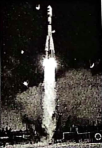
On 20 July 1969, the world celebrated an important moment in history when American astronaut, Neil Armstrong, became the first man to walk on the moon, making a giant leap for humanity. For more than 50 years, human beings have tried many times to understand the space environment. These efforts have paid off. Today, we are in a better position to understand our universe in which we live, thanks to space exploration.
Space exploration has triggered advances in science and technology which have benefitted humans and improved the quality of life on Earth. These benefits are related to space technology such as satellite communications, global positioning system(GPS) and weather forecasting. The development of satellite technology, for instance, makes telecommunications possible, connecting people from different parts of the world through satellite television, phones, radio and Internet access. Today, space technology also enables us to have virtual (虚拟的) meetings and lessons, making work and study from home possible during the Covid-19 pandemic.
With the excitement and curiosity generated (产生), space exploration is attracting young people to careers in engineering, science, technology and mathematics, which creates innovations (创新) in science and technology. In countries such as America, Canada and Europe, space exploration has also generated jobs in fields related to engineering, technology and science. Even if interested youngsters do not end up in a job in these areas, space technology enriches their imagination about the possibility of life beyond Earth and space travel. To this end, space exploration continues to encourage human imagination, inspiring (激励) people to write stories and create movies, photographs and songs about space exploration.
Although there are many benefits, space exploration has often been criticized (批评)for its high cost. According to the University of Florida, it costs about $500 million to launch (发射) a space shuttle and many argue that this money could be better spent on solving the problems on Earth such as hunger, pollution, diseases and climate change. Although space exploration cannot directly provide immediate solutions to these problems, it generates many useful technologies and new knowledge in sciences necessary to improve the conditions of human life on Earth.
Every year, about a thousand innovations in the space programmes find their way into earthly technology that leads to better farming; better medical instruments; and more energy-efficient vehicles(交通工具). As a result, the money spent on space exploration does finally benefit human beings.
There is no doubt that space exploration has produced many benefits for humanity. It has also encouraged many to understand Earth and the universe in a deeper way. In the coming decade, we can continue to expect more exciting discoveries. We may eventually even find another planet where humans can live.